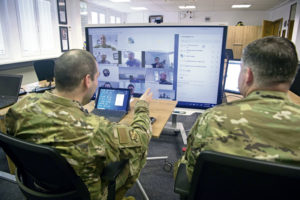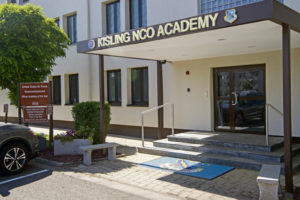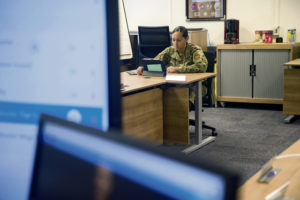Due to COVID-19 restrictions, cadre at the Kisling Noncommissioned Officer Academy, Kapaun Air Station, opened their virtual doors for the first online class in Europe on June 15.
To get here, academy staff devoted three months in professional development training, tailoring the curriculum to an online format while staying true to the Kisling NCOA mission to educate, motivate, cultivate and inspire enlisted Airmen throughout U.S. Air Forces in Europe and Air Forces Africa.
“We covered the entire curriculum together as a team,” said Tech. Sgt. Robert Conniff, NCOA instructor, as he prepared for the 150-student class. “We created numerous project teams to hyper-focus on areas of concern for the good of the program.”

Teleworking during COVID-19 restrictions served as a catalyst to prepare the instructors to present, educate and deliver curriculum virtually.
“We incorporated activities and exercises that are designed to enhance lesson objectives while doing our absolute best to replicate the in-residence experience,” said Chief Master Sgt. Terrance Smiley, Kisling NCOA commandant.
Comparing the in-residence and virtual courses, one of the main differences will be the number of hours students and instructors spend together.
“Teaching in a virtual environment will bring types of fatigue uncommon to the in-residence class version,” said Conniff, also noting the way students network will be somewhat different.
“We, as a cadre, have thought through these issues,” Conniff continued, “and have provided as many avenues as possible to try and duplicate the feeling of being at the academy.”

One of the biggest differences to teaching online, Tech. Sgt. Alex Torelli, NCOA instructor, found was the way instructors facilitate conversations.
“There will be options to type in a chat, speak in the meeting, and deliver your thoughts through discussion posts and whiteboards,” Torelli, one of ten primary instructors, said. “I also think that internet connectivity will be an issue for some. However, we spent this past week having small meet-and-greets with the class and were able to work out quite a few kinks.”

Smiley said one of the cornerstones of professional military education is feedback, so they built in a special feedback session at the end of each day to assess how the course is going so they can adjust as needed. He also said he doesn’t foresee virtual NCOA being a permanent solution.
“As an institution, we value the in-residence PME experience. There are certain things that cannot be captured through a virtual platform, such as building relationships, or drill and ceremony activities that serve to develop our future leaders,” said Smiley.
“We, as an academy, look forward to the day when we can have USAFE-AFAFRICA’s best and brightest walk through our doors again,” said Conniff. “Until that day comes we will continue to sharpen the sword by utilizing innovation and technology.”


